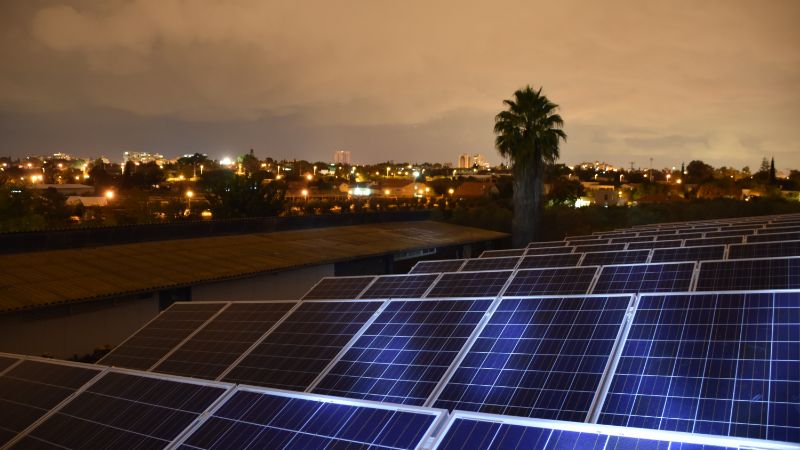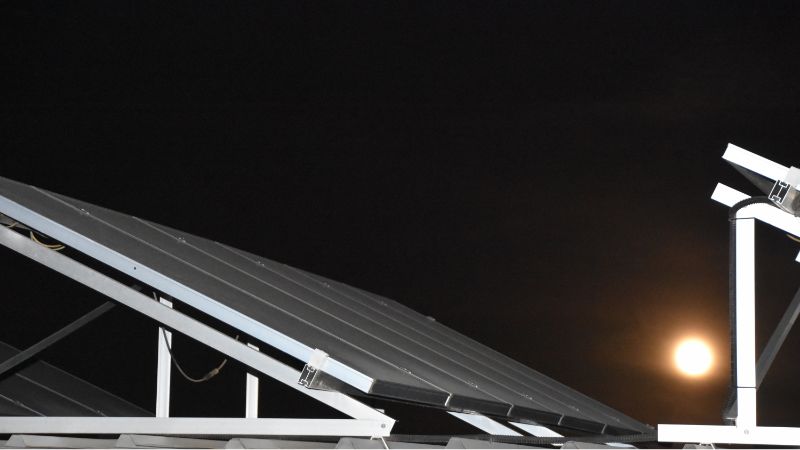No, solar panels do not generate electricity at night. They require sunlight to produce power. However, that doesn’t mean your home goes dark after sunset. Homes with solar panels stay powered all night long by using one of two common solutions: drawing electricity from the public grid or using energy stored in a solar battery.
This article breaks down why solar panels need the sun, how your home can still run on solar-powered energy after dark, and what future technology holds for nighttime power.

Why Sunlight is Essential for Solar Energy System
Solar panels create electricity through a process called the photovoltaic effect. Think of it like this:
- Sunlight Hits the Panel: Your solar panels are made of photovoltaic cells, which are typically made from silicon.
- Electrons Get Energized: When photons from sunlight strike these cells, they energize electrons, causing them to move.
- An Electric Current is Created: This movement of electrons creates a direct current (DC) of electricity.
- Power for Your Home: An inverter converts this DC electricity into alternating current (AC), the type of electricity used to power your appliances.
Without sunlight, there are no photons to start this process, so energy production stops completely. Your solar panels go into a dormant “sleep mode” overnight.
How Solar Panels Generate Electricity
Solar panels generate electricity using sunlight, converting solar energy into usable electrical power through a process called the photovoltaic effect. This process relies on specific materials and environmental conditions to function effectively.
The Basic Science of Photovoltaic Cells
Photovoltaic cells consist of semiconductor materials, typically silicon, that absorb photons from sunlight.
Absorbing photons excites electrons, creating an electric current.
Connecting multiple cells forms a solar panel, increasing energy output.
Inverting direct current (DC) to alternating current (AC) makes electricity compatible with home appliances.
Why Darkness Halts Energy Production
Solar panels require light photons to initiate electron movement.
Darkness eliminates photon availability, stopping electricity generation.
Energy production ceases completely without a light source.
Stored energy from batteries or grid connections powers homes at night.
The Reality of Solar Power After Sunset
Your solar panels stop producing electricity once the sun goes down, but your home doesn’t have to go dark. You can still use solar energy at night through storage or grid connections.
Direct Energy Generation Is Not Possible
Solar panels require direct sunlight to generate power. They operate using the photovoltaic effect, which depends on photons from sunlight striking semiconductor materials like silicon to free electrons and produce an electric current. Without sunlight, this process stops completely. Your panels enter a sleep mode overnight, and your inverter typically shuts off due to the absence of usable energy production.
The Common Misconception About Moonlight
Moonlight is reflected sunlight, but it’s approximately 350,000 times weaker than direct sunlight. Your solar panels might produce a tiny amount of electricity—around 0.3% of their daytime output under a full moon—but this amount is negligible. It can’t power your devices or home. Researchers are exploring experimental technologies like radiative cooling, which can generate about 50 milliwatts per square meter at night, but these aren’t practical for residential use yet.
How Homes With Solar Panels Access Power at Night
Even though your panels aren’t producing, you have two excellent options to keep the lights on and appliances running smoothly after dark.
Option 1: Net Metering (Connecting to the Grid)
Most residential solar systems are connected to the public utility grid. This setup allows for a seamless flow of energy through a system called net metering.
- During the day: Your solar panels often produce more electricity than your home needs. This excess power is sent back to the grid.
- At night: When your panels are inactive, you simply draw electricity from the grid, just as you did before installing solar.
Your utility company tracks the energy you send and receive. The excess power you contribute during the day earns you credits, which offset the cost of the power you use from the grid at night. In effect, the grid acts as a giant, shared battery for your excess energy.
Benefits of Net Metering:
- Cost-Effective: It allows you to benefit from solar power at night without the upfront cost of a battery.
- Reliable: You have a constant, reliable power source from the grid.
- Maximizes Savings: You can earn credits for all the excess power you generate.
Option 2: Solar Battery Storage
If you want to be more energy-independent or protect yourself from power outages, you can add a solar battery to your system.
- During the day: Excess solar energy that isn’t used by your home is used to charge the battery.
- At night: Instead of drawing power from the grid, your home automatically switches to using the clean energy stored in your battery.
A solar battery allows you to store your own solar power for use whenever you need it, including during peak-cost evening hours or when the grid goes down.
Benefits of Solar Batteries:
- Energy Independence: Reduces your reliance on the utility grid.
- Backup Power: Provides seamless power during blackouts.
- Avoid Peak Rates: You can avoid paying high electricity rates during evening peak hours by using your stored energy instead.

The Future: Emerging Nighttime Solar Technology
While not yet available for residential use, scientists are developing exciting new technologies that can generate small amounts of power at night. These experimental “anti-solar panels” work by using a process called radiative cooling. They take advantage of the temperature difference between the solar cell and the deep cold of outer space to generate a small electric current from escaping infrared heat.
Currently, this technology can only produce a tiny fraction of the power of a traditional solar panel, but it holds promise for future off-grid and specialized applications.
Maximizing Your Solar Investment Around the Clock
You can still use solar power at night through net metering and battery storage. These options help you maintain energy access and savings even after the sun goes down.
Optimizing Daytime Production for Nighttime Use
Install a solar panel system that covers your annual electricity consumption. This setup accumulates enough credits during peak months for later use. Pair the system with smart home devices like timers, sensors, and smart thermostats. These tools optimize energy use when solar production is available. Using energy primarily during daytime enhances your solar benefits by reducing grid reliance at night.
Choosing the Right System for Your Needs
To use your solar energy at night, you’ll need a battery storage system. A great example is the lineup from Deye, which offers reliable solutions for different needs.
For Homes: The Deye Low Voltage (LV) Series is a perfect fit. It uses safe Lithium Iron Phosphate (LFP) batteries and has a modular design, so you can expand it later. It’s a durable, long-term solution for 24/7 home power.
For Businesses: The Deye High Voltage (HV) Series is built for larger commercial needs, offering optimized performance and efficiency to keep operations running smoothly after sunset and during outages.
By adding the right battery, your solar panels become a true round-the-clock power source. To see what a complete solution looks like, you can explore Deye’s newest energy storage systems and contact our team for professional advice.
Choosing the Right System for Your Needs
To maximize your solar investment, a battery storage system is essential for true energy independence and backup power. Deye ESS offers tailored solutions that allow you to use solar energy 24/7.
For Residential Use: Deye’s Residential ESS solutions feature safe, cobalt-free LFP batteries in a modular design. This allows you to store excess solar power for nighttime use and provides seamless backup during grid outages, ensuring your home stays powered.
For Commercial and Industrial (C&I) Applications: Deye’s C&I ESS solutions deliver robust, scalable energy storage for commercial and industrial needs. These systems help reduce peak demand charges and provide reliable, uninterrupted power for critical operations.
Whether for a small home or a large industrial facility, Deye’s battery systems empower you to use your solar energy around the clock. To explore the full range of residential and commercial solutions and configure the perfect system for your energy goals, visit Deye ESS Product Offerings.
Conclusion
So while your solar panels won’t generate power at night you’ve got plenty of options to keep your lights on. Whether you choose grid connection with net metering or invest in battery storage you can enjoy solar benefits around the clock.
Emerging technologies might one day change the game but for now these solutions work beautifully. Your solar investment continues paying off even after the sun goes down. You can rest easy knowing your home stays powered through smart planning and today’s available technology.
Frequently Asked Questions
How can I use solar power at night?
You can use solar power at night by storing excess daytime energy in batteries or by staying connected to the electrical grid. With net metering, surplus energy sent to the grid during the day earns credits that offset your nighttime electricity usage, ensuring continuous power.
Can solar panels generate electricity from moonlight?
No, solar panels cannot generate meaningful electricity from moonlight. Moonlight is reflected sunlight and is far too weak to produce usable energy—typically only about 0.3% of daytime output. For practical purposes, this is negligible and not a reliable power source.
What is net metering and how does it help at night?
Net metering allows you to send excess solar energy to the grid during the day in exchange for credits. These credits can be used to cover your electricity consumption at night when your panels aren’t producing, reducing your overall energy costs and maximizing your solar investment.
Are there solar panels that work at night?
Not yet for residential use. Scientists are developing experimental technologies that can generate a very small amount of power from heat radiating off the panel at night, but these are not commercially available and cannot power a home.
How can I maximize my solar energy use at night?
To maximize nighttime solar energy use, consider pairing your system with battery storage or utilizing net metering. Optimize daytime production by sizing your system to match annual consumption and using energy-efficient appliances. These strategies help ensure reliable power after dark.